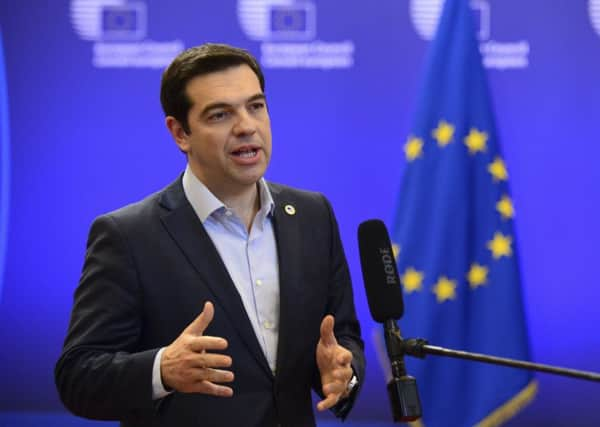Greek bailout gamble sparks global jitters


Prime minister Alexis Tsipras was due to brief parliament on the course of the stalemated talks in an emergency session last night, as outrage over the creditors’ demands for more austerity reforms grew within his own cabinet.
The Syriza-led government on Thursday asked to bundle together its four June IMF debt repayments totalling €1.6 billion (£1.1bn) into one on 30 June. The first instalment was due yesterday, and the move to delay payment raised fears that Greece’s financial position is even worse than thought, threatening its place in the eurozone.
Advertisement
Hide AdAdvertisement
Hide AdIt is the first time a developed economy has taken the option of bundling payments – an emergency manoeuvre allowed by the IMF but last taken up by Zambia in the 1980s. The main stock market in Athens fell 4.1 per cent, while the Stoxx 50 index of leading European shares was down 1 per cent. Greece’s borrowing costs also shot up, with the interest rate on its two-year bonds standing at 24.5 per cent.
“The probability of an eventual debt default has clearly risen, which could set off a process that includes capital controls to prevent meltdown in the Greek banking system,” said Neil MacKinnon, global macro-strategist at VTB Capital.
Labour minister Panos Skourletis sought to ease concerns about Greece’s financial situation, claiming the decision to bundle the IMF payments was a political one.
Although Greece is suffering a cash crunch, “today’s instalment could have been paid easily. There was that possibility,” Mr Skourletis said.
Greece’s left-led coalition government, elected in January on promises to end deeply resented austerity measures, has been at loggerheads for months with its creditors and the institutions overseeing its bailout – the European Central Bank, IMF and European Commission.
In a visit to Brussels on Wednesday, Mr Tsipras was handed a proposed deal drafted by the three institutions. He rejected it, saying it insisted on the very budget measures his government blames for shattering Greece’s economy, which has contracted by 25 per cent. Greece’s proposals, he said, were the only credible ones.
At least two ministers suggested early elections could be an option if the creditors did not back down. Social security minister Dimitris Stratoulis described creditors’ demands as “inhuman [and] degrading,” such as cutting pensions to €300 a month. The only solution, he said, was for the creditors to compromise.
“If they don’t back down from this blackmailing package … the government won’t back down and therefore … it is obliged to seek alternatives,” he said on Antenna television. “That means elections.”
Advertisement
Hide AdAdvertisement
Hide AdHe also said elections were possible if Greece could not reach a deal, with the population to be asked to decide whether they wanted to stay in the euro at any cost.
“The problem now is political,” said Megan Greene, chief economist at Manulife Asset Management. “Syriza MPs seem outraged by the creditor’s proposed programme, which suggests Mr Tsipras will have a very difficult time selling this reform programme to his party.”